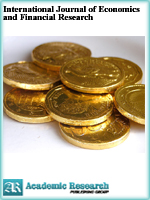International Journal of Economics and Financial Research
Online ISSN: 2411-9407
Print ISSN: 2413-8533
Print ISSN: 2413-8533
Quarterly Published (4 Issues Per Year)

Archives
Volume 4 Number 3 March 2018
Does Devaluation of Turkish Lira Improve Merchandise Trade Deficit?
Authors: Ali Mohammed Adem ; Beng? Vuran
Pages: 64-71
Abstract
After the fall of Bretton Woods System, exchange rates become the focus of researchers and politicians. When a floating exchange rate system was started researchers investigated the impact of exchange rate volatility on international trade but the development of derivative instruments changed the researchers focus from currency volatility towards the impact of currency appreciation or depreciation on international trade. The main objective of this research was to investigate the short run and long run relationship between Turkey’s merchandise trade deficit and real effective exchange rate. The monthly data was collected from Central Bank of Republic of Turkey from March 2005 to September 2017. Autoregressive distributed lag (ARDL) approach and Error correction model (ECM) was used for the analysis. The finding shows that the variables have long run relationship but it is not significant at 5% significance level. The short run model also shows the insignificant results. These findings have the following policy implication: Turkey cannot improve the merchandise trade deficit by devaluating its currency.
Non-Linearity in Determinants of Corporate Effective Tax Rate: Further Evidence from Nigeria
Authors: Yinka Mashood Salaudeen ; Rafiu Olayinka Akano
Pages: 56-63
Abstract
This study employs quantile regression analysis to examine possible non-linearity in the determinants of corporate effective tax rate (ETR). The results generally indicate that the examined determinants have significant impact on ETR along the decides and confirm non-linearity in the distribution of ETR. Firm size, firm leverage and inventory intensity are most influential variables while capital intensity and profitability are fairly influential across the ETR of firms. However, tax expert, firm size and inventory intensity are the most influential for firms with lower ETR. The study also confirms that large firms enjoy political clout but smaller firms are also able to reduce their fiscal pressure. The influence of human controllable factors is also evident in the study.



